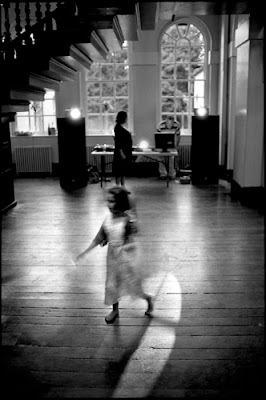
What do we mean when we say a photograph is technically perfect? In fact I wonder is it a good thing to dwell on such things? I began to consider the topic of technical perfection seriously this morning when I read comments criticizing Henry Cartier Bresson for being technically imperfect. It's no secret that at times he was technically imperfect. However I was quite surprised someone could be so obsessed with the technical as to miss the undoubted emotional and artistic merits of H.C.B.'s vast body of groundbreaking work.
To me a technically perfect photograph, one devoid of meaning, is anathema. It is a photograph that asks no questions of my eye and makes no demands on my mind. It does not engage me at all. Its like a brand new show home. Beautiful on the surface but too anodyne and sterile to stay there long.
Please don't think that I am not suggesting that technical discipline is not required in photography. I am suggesting something quite to the contrary. There are too many lazy artists already I wouldn't suggest that you join their already bloated ranks by throwing any craft to the wind and trusting only your 'muse'. What I am suggesting to you is that obsession with nothing but technical perfection is the death of a thousand cuts to your creative eye. The end result is images like thousands of others. Images with no relevance and no originality. Images that serve no purpose other than that of a dry technical exercise.
I believe strongly that our eyes and through them our minds really enjoy a visual puzzle. A visual puzzle engages us and holds our attention. It's a feast for the eye and it stops us from becoming bored with an image before we have engaged with it. In fact I'd suggest it is often an images quirks and imperfections that grip us the most.
Take the image in this article kindly provided by extremely talented Aardman Animation photographer Luke Smith. It could be argued it has technical imperfections. It has converging verticals, motion blur and some dubious areas of exposure. I'd argue strongly that it's a dynamic image, it makes suggestions to us. It tells a story that demands more of our energy to figure out what's occurring. We can even easily apply our own interpretation to it. In short it engages us as viewers and holds us there. I could go further and state it's the blur and dynamic 'on the fly' feel of the image generated by it's imperfections that add most to this image. In short it is when measured by my yardstick and excellent and engrossing image.
I'll end with Luke's own thoughts on his image:
It's been interesting reading the threads about Cartier Bresson and peoples thoughts about technical perfection in photography. In case you don't already know this image shows where I stand on the subject...
I need say no more...
No comments:
Post a Comment